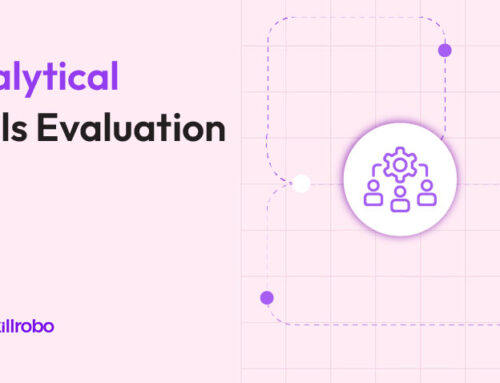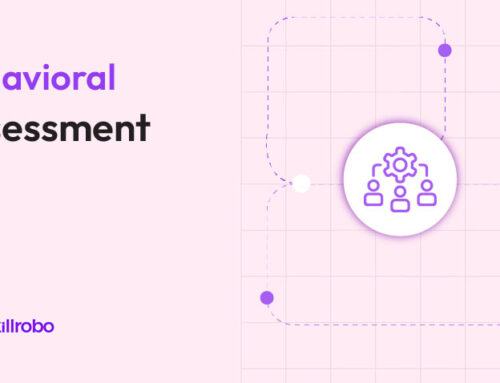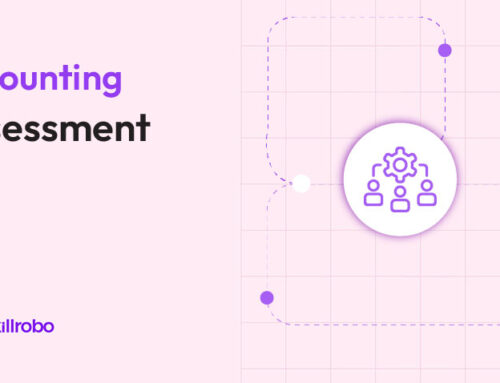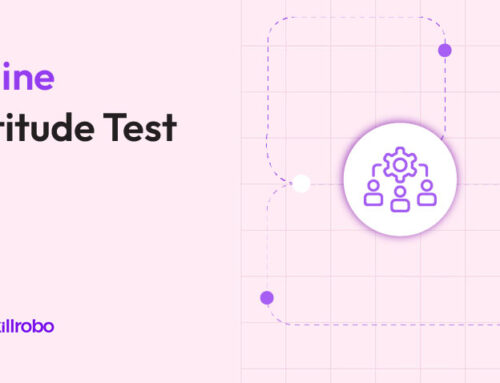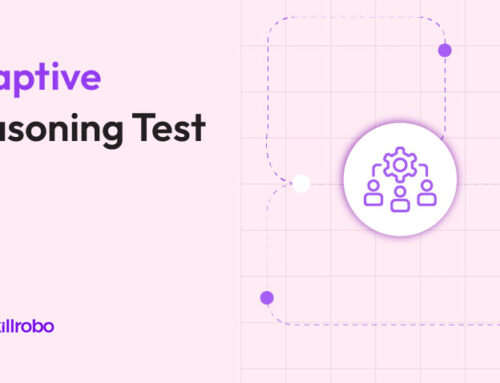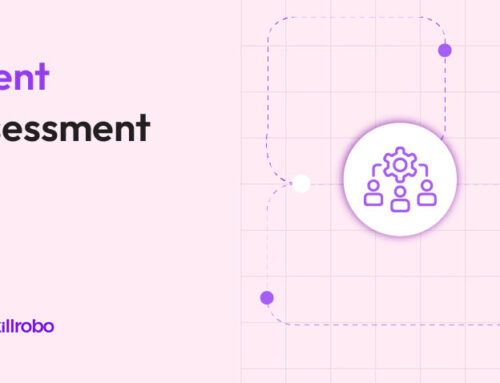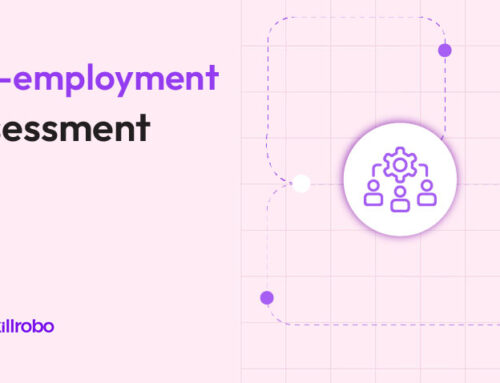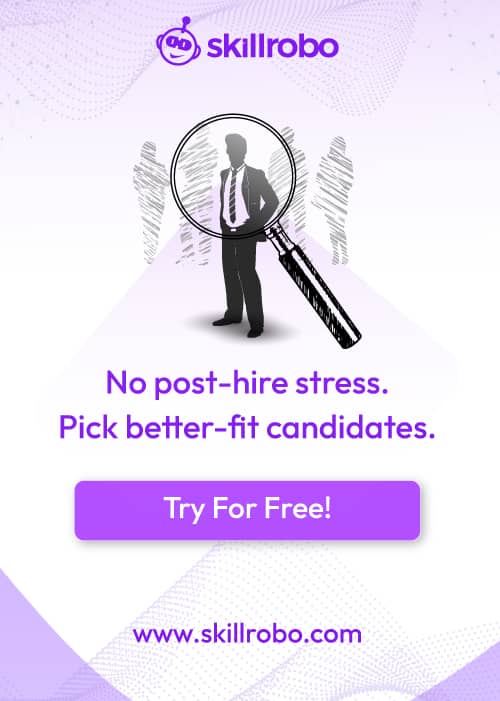Table of Contents
- Key Takeaways
- Why Skills Assessment Matters
- What is a Skills Assessment Test?
- Why Use a Skills Assessment Test?
- Key Benefits of Skills Assessment Tests
- Types of Talent Assessment Tests
- Popular Formats of Skills Assessments
- How Do Talent Assessment Tests Work?
- Steps to Implement a Talent Assessment Test
- How to Find the Right Talent Assessment Test for Evaluation?
- Best Practices for Leveraging Skills Assessment Tests
- Why must you choose Skillrobo’s Talent Assessment Test?
- Conclusion: Make Skills Assessments Work for You
- Frequently Asked Questions
Related articles
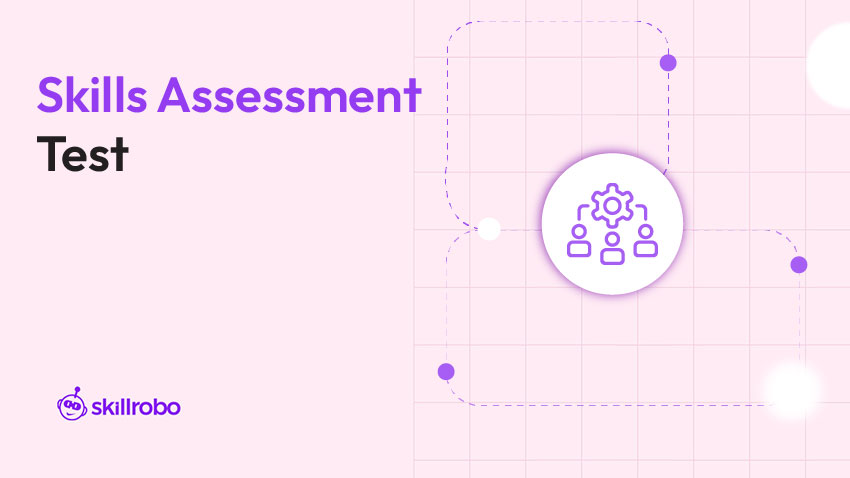
Key Takeaways
-
Talent assessment tests help evaluate cognitive, behavioral, and technical skills, enabling recruiters to make informed, data-driven hiring decisions efficiently.
-
Combining multiple assessment formats—like cognitive, behavioral, and work samples—offers a more complete picture of candidate capabilities and job readiness.
-
Using standardized tests reduces hiring bias, enhances workforce diversity, and aligns recruitment with organizational culture and role-specific requirements.
-
Skillrobo provides customizable, AI-powered assessment tools that streamline hiring, reduce onboarding time, and improve overall recruitment quality.
Why Skills Assessment Matters
Selecting the right candidate for a job is a critical decision, and one that goes beyond just resumes and interviews. Not every applicant is a perfect fit for a specific role, and choosing someone who can genuinely add value to the team, the organization, and its long-term goals is no small task. This is where skills assessment tests become essential. They offer recruiters an objective, data-driven way to evaluate whether a candidate truly possesses the required competencies for the job.
In this blog, we’ll explore what a skills assessment test is, its key types, the benefits it offers, and how to implement it effectively within your hiring or employee development process.
What is a Skills Assessment Test?
When multiple candidates appear qualified on paper, recruiters face the challenge of identifying who’s the best fit for the role. A skills assessment test helps solve this by evaluating a candidate’s ability to perform specific job-related tasks in real-world scenarios. Unlike resumes or interviews, these tests focus on practical application, not just educational background or prior experience.
For example, if three applicants hold similar qualifications and work histories, a skills test can highlight key differences in areas such as technical proficiency, critical thinking, and attention to detail—insights that are often missed during traditional interviews.
Put simply, a skills assessment test measures cognitive abilities, practical competencies, and role-specific knowledge. It’s used not only in hiring but also in employee skill assessments for training, promotions, and identifying team-wide skill gaps. When implemented effectively, it becomes a strategic tool for both talent acquisition and workforce development.
Why Use a Skills Assessment Test?
Hiring the right candidate involves more than checking resumes and conducting interviews. A skills assessment test provides a structured, objective way to evaluate whether a candidate possesses the practical abilities, cognitive strengths, and soft skills required to succeed in a role. These tests allow HR teams to move beyond guesswork and make data-driven hiring decisions with confidence.
Skills assessments are especially useful for reducing time-to-hire and minimizing the risk of costly mis-hires. By testing candidates early in the funnel, recruiters can filter out unsuitable applicants and focus only on those who meet role-specific performance benchmarks. The process is streamlined, efficient, and results-oriented, ensuring better hiring outcomes for both technical and non-technical roles.
Well-designed assessments can evaluate critical areas such as:
-
Problem-solving ability
-
Role-specific technical skills
-
Communication and collaboration
-
Learning agility and adaptability
-
Alignment with team dynamics and workplace culture
When paired with platforms like Skillrobo, a pre-employment assessment software, organizations gain access to customizable templates, automated reporting, and test integrity features—all of which enhance the screening process significantly.
Key Benefits of Skills Assessment Tests
Skills assessment tests have become indispensable for making hiring smarter and more strategic. These tests go beyond resumes and interviews to measure how candidates apply knowledge in real-world job scenarios. By evaluating both technical and soft skills, they help organizations improve hiring accuracy, reduce costs, and enhance long-term retention. Platforms that offer cloud-based online aptitude tests for enterprises make it easier to deploy assessments at scale, ensuring consistency and objectivity across the hiring funnel.
1. More Accuracy in Identifying the Right Candidates
Skills tests go beyond surface-level qualifications and help employers evaluate how candidates perform under real-world conditions. This provides a clearer, more reliable picture of their job readiness, helping recruiters make evidence-based decisions. It also significantly reduces the impact of personal bias, ensuring a fairer shortlisting process.
2. High-quality Hires
By assessing specific competencies relevant to the role, skills assessments allow hiring managers to focus only on candidates with true job fit. Standardized evaluation formats remove ambiguity and ensure each applicant is judged on the same merit-based criteria, leading to consistently higher-quality hires who are more likely to succeed and contribute from day one.
3. Enhanced Diversity in the Workplace
Manual resume reviews and unstructured interviews often prolong the hiring process and drain HR resources. Online skills assessments automate the screening phase, generating instant performance insights and auto-scored results. This reduces recruiter workload, shortens hiring timelines, and improves the cost-efficiency of the entire recruitment cycle.
Solutions like automated pre-employment skill assessments are particularly effective in fast-paced hiring environments, enabling recruiters to screen large candidate volumes without compromising assessment accuracy or depth.
4. Reduced Onboarding Time and Costs
Objective testing ensures that all candidates, regardless of background, education, or personal identifiers, are evaluated equally. By focusing on skills over credentials, companies can foster a more diverse workforce and reduce the unconscious bias that often creeps into traditional hiring processes. This inclusivity leads to richer team perspectives and stronger innovation.
5. Increased Employee Satisfaction
Candidates selected through targeted skill assessments are more likely to feel confident and prepared in their new roles. When there’s a strong alignment between role expectations and candidate strengths, it leads to better communication, higher team morale, and increased productivity. Managers can also use assessment data to place hires in teams where they complement existing dynamics.
6. Greater Employee Retention Rate
A mismatch between candidate capability and job expectations is one of the leading causes of early attrition. Skills assessments reduce this risk by identifying both strengths and potential limitations upfront. Employees who start with clarity and confidence are more likely to stay longer, grow in the role, and deliver sustained value.
7. Stronger Talent Pipelines and Internal Mobility
These assessments don’t just support hiring—they also enhance internal workforce development. HR teams can identify high-potential employees, design role-specific upskilling plans, and promote from within using objective data. Over time, this builds a stronger, more agile organization prepared to respond to changing business needs.
8. Better Talent Sourcing
With performance data from standardized assessments, companies can refine their recruitment strategy to focus on the sources that consistently produce top talent. It allows for better forecasting, improved hiring benchmarks, and the creation of a repeatable, scalable model that aligns sourcing efforts with organizational goals.
Types of Talent Assessment Tests
Skills assessments fall into two major categories—cognitive ability tests and behavioral assessments. For best results, companies often combine both, creating a balanced evaluation that uncovers technical proficiency, workplace behavior, and learning agility. This blended model improves hiring accuracy while giving HR deeper insight into candidate potential.
- Cognitive ability tests
- Behavioral or Personality tests
1. Cognitive Ability Tests
Cognitive ability tests are designed to assess how well a candidate processes information, solves problems, and adapts to new situations. These tests evaluate vital mental faculties such as numerical reasoning, verbal logic, memory retention, pattern recognition, and spatial awareness. For example, a candidate applying for a data-intensive role might be asked to interpret graphs, perform basic calculations, or draw logical conclusions from abstract information.
Organizations often use these assessments to measure not just current capabilities, but also how quickly an individual can be trained or reskilled. Cognitive testing is particularly valuable when screening for roles that involve decision-making under pressure or complex task execution. Platforms like Skillrobo feature structured cognitive testing modules tailored for different job levels, allowing recruiters to benchmark candidate performance against role-specific expectations.
One limitation of cognitive tests, however, is that they do not measure personality or interpersonal effectiveness, making it important to pair them with other evaluation tools for a holistic view.
2. Behavioral Assessments
Behavioral assessments, also known as personality or psychometric tests, explore the candidate’s values, working style, and interaction tendencies. These assessments are ideal for understanding how well a candidate fits into the organization’s culture or a specific team dynamic.
Through a mix of scenario-based questions, forced-choice dilemmas, and self-descriptive statements, behavioral tests provide insight into key traits such as leadership potential, adaptability, emotional intelligence, and conflict resolution style. This data is invaluable when hiring for roles that require collaboration, customer interaction, or cross-functional responsibilities.
Skillrobo includes tools to identify key personality traits that impact team alignment and long-term success. By mapping candidate behavior to specific job functions, HR can improve both hiring accuracy and employee satisfaction from day one.
Popular Formats of Skills Assessments
Skills assessments come in various formats, each tailored to evaluate different aspects of candidate performance. Choosing the right format ensures a deeper understanding of both hard and soft skills, leading to more accurate hiring, promotion, and employee development decisions.
1. Situational Judgment Tests (SJTs)
SJTs present candidates with hypothetical, job-relevant scenarios and ask how they would respond. These tests are designed to measure decision-making, ethical reasoning, and interpersonal skills. For instance, a candidate may be asked how they would handle a conflict between team members or resolve a customer complaint. SJTs are especially useful in evaluating soft skills like communication, empathy, and conflict resolution, which are difficult to assess through traditional interviews.
2. Integrity Tests
Integrity assessments focus on a candidate’s sense of ethics, reliability, and honesty. These behavior-based questionnaires often ask how a candidate might act in morally ambiguous situations, such as witnessing policy violations or managing confidential information. They’re especially useful in roles where trustworthiness is key—such as finance, HR, or customer support.
3. Technical Skill Assessments
These tests evaluate proficiency in job-specific knowledge and skills. For example, a coding assessment for a software developer may include debugging tasks, while an accounting role might involve financial statement analysis. These tests help ensure candidates not only understand the theory behind the role but can also apply their skills in a real-world context. Tools like Skillrobo allow companies to design customized technical skill assessments that align closely with actual job tasks.
4. Work Sample Assessments
Work samples simulate actual tasks the candidate would perform on the job. A content writer might be asked to write a blog, while a marketing analyst could be tasked with interpreting campaign data. These tests provide a highly predictive measure of future job performance and help hiring teams make confident decisions based on demonstrated ability.
5. Video Interviews
Video assessments ask candidates to record answers to pre-set questions. This allows hiring managers to evaluate communication clarity, tone, body language, and confidence at their convenience. Video formats are particularly helpful for remote hiring, offering a scalable way to assess candidate presentation skills before scheduling live interviews.
How Do Talent Assessment Tests Work?
Skills tests can be administered online or offline, but digital assessments offer unmatched flexibility and scale. Candidates complete standardized questions—ranging from multiple choice to open-ended formats—within a time limit. The results are automatically scored and categorized for easy shortlisting. These insights enable recruiters to make objective, data-driven hiring decisions faster and with greater accuracy.
Skillrobo offers the flexibility to create and distribute customized online skill tests using a drag-and-drop test builder, ensuring alignment with job needs and reducing recruiter workload. With options for proctoring, instant reports, and public test URLs, it simplifies assessment delivery across distributed teams or high-volume hiring campaigns.
Steps to Implement a Talent Assessment Test
Implementing a skills assessment test isn’t just about selecting questions—it’s about aligning the test with business goals, role requirements, and hiring timelines. When structured properly, skills assessments can accelerate decision-making, reduce bias, and consistently deliver high-quality candidates across teams.
Step 1 – Align with Business Needs
Start by identifying the broader talent objectives behind the assessment. Are you hiring to scale a team quickly? Looking to backfill a niche technical role? Or building a future-ready talent pool? Defining the purpose early ensures the assessments you design are role-relevant, outcome-driven, and in sync with workforce planning.
Step 2 – Set Clear Objectives
Pinpoint the exact competencies you want to assess. Do you want to measure coding skills, attention to detail, written communication, or leadership readiness? Clarifying these goals will determine what type of test (cognitive, behavioral, or technical) is most appropriate and how it should be structured. This clarity avoids testing irrelevant skills and improves the candidate experience.
Step 3 – Choose the Right Assessments
Select assessment types that best align with the job function and seniority level. Use a mix of formats like cognitive ability tests, technical work samples, and behavioral evaluations to form a balanced view of each candidate. If you’re hiring at scale, ensure your platform supports bulk testing, reporting, and automated scoring. Skillrobo offer pre-designed and customizable assessments for different industries and roles.
Step 4 – Define Evaluation Criteria
Set benchmarks before administering the tests. Decide what constitutes a pass/fail, and how different skill areas will be weighted. Evaluation rubrics and scoring thresholds help eliminate subjectivity and ensure consistency across hiring panels. This standardization becomes critical when comparing multiple candidates for similar roles.
Step 5 – Administer the Tests
Distribute tests securely through browser-based platforms that support proctoring and access controls. Digital test delivery saves time, allows for remote participation, and makes it easy to accommodate large applicant pools. With Skillrobo, you can send test links via public URLs or embed them into career pages, making the process seamless for candidates and recruiters alike.
Step 6 – Analyze Results
After test completion, use the platform’s analytics dashboard to assess individual and comparative performance. Look for patterns in strengths, skill gaps, and time taken per section. This data-driven approach helps shortlist top performers and flags inconsistent or concerning results for further review.
Step 7 – Provide Feedback and Take Action
If your hiring process supports feedback, share high-level test insights with candidates, especially those you want to nurture for future roles. Internally, use the results to guide structured interviews, onboarding plans, and training programs. A candidate who scores well in logic but poorly in communication may still be valuable with the right development plan.
How to Find the Right Talent Assessment Test for Evaluation?
Selecting the right skills assessment tool can make or break your hiring process. A well-matched platform allows recruiters to accurately evaluate real-world job capabilities, while an ill-fitting one may lead to biased or ineffective decisions. The key lies in combining the right test formats—cognitive, technical, and behavioral—to match both the role and your organizational needs.
To make a confident selection, follow these steps:
-
Research different types of skill assessments – Understand what tools are available for technical, soft skill, cognitive, and behavioral testing.
-
Match assessments to job roles – Choose formats based on what the job actually requires, such as coding tests for developers or writing samples for content roles.
-
Run pilot assessments – Test your top 2–3 platforms internally to evaluate ease of use, reporting clarity, and candidate experience.
-
Review the results – Look for tools that deliver clear, actionable data to support decision-making and help standardize shortlisting.
Remember, the right mix of assessments should reflect the responsibilities of the role, the traits required for success, and the hiring goals of your team.
Best Practices for Leveraging Skills Assessment Tests
Implementing a skills assessment tool effectively requires more than just choosing the right platform. To truly elevate your hiring process, you need a thoughtful, structured approach that aligns with both business goals and candidate expectations. Here are key practices to follow:
1. Reduce Dependence on Resumes
Traditional resumes can be misleading or overly generic, often failing to reflect real capabilities. Skills tests provide objective data on what a candidate can do, not just what they claim to know. By using assessments early in the process, you shift focus from credentials to actual competence, allowing stronger, skills-first hiring decisions.
Example: Replace first-round resume screenings with cognitive and task-specific evaluations to instantly filter top performers.
2. Implement Assessments Early in the Hiring Funnel
Use skill evaluations as a screening tool rather than a final validation. When used at the start of your recruitment process, assessments can drastically cut down the number of unqualified candidates entering the interview pipeline, saving time and reducing effort for hiring managers.
3. Prepare Candidates for Success
Transparent communication builds trust and improves test completion rates. Share clear instructions, timelines, and sample questions to help candidates feel confident and engaged. This also ensures you’re evaluating them under optimal conditions, free from confusion or uncertainty.
Pro Tip: Add a short FAQ before the test explaining its purpose and scoring structure.
4. Regularly Update Test Libraries
As job roles evolve, so should your assessments. Review and refresh your question sets regularly to keep them relevant, challenging, and aligned with industry standards. This is especially important for technical or fast-changing roles like software development or digital marketing.
5. Blend Testing with Structured Interviews
Assessments work best when paired with well-structured interviews. Use test results to guide interview questions—probing deeper into strengths, addressing weaknesses, or validating borderline scores. This combination leads to more informed, holistic hiring decisions.
Example: Use the outcome of a communication skills assessment to tailor behavioral interview questions for client-facing roles.
6. Monitor Test Metrics for Continuous Improvement
Don’t just evaluate candidates—evaluate the assessments themselves. Track completion rates, average scores, drop-off points, and candidate feedback. These metrics help refine your test strategy and ensure you’re measuring the right capabilities effectively.
7. Ensure Fairness and Accessibility
Make sure the assessment platform you use supports inclusive hiring. Tests should be mobile-friendly, accessible to candidates with disabilities, and free of cultural or language bias. Fairness boosts your employer brand and encourages a more diverse candidate pool.
8. Align Results with Business Impact
Use assessment insights not just to hire, but to forecast role success, identify training needs, and support workforce planning. The more you align test outcomes with on-the-job performance data, the more strategic value you unlock from your assessments.
Why must you choose Skillrobo’s Talent Assessment Test?
Skillrobo is a powerful online skills assessment platform designed to simplify and elevate how companies evaluate candidate capabilities. With a wide range of role-specific test templates and customization options, it enables recruiters to pinpoint the right talent with precision. Whether you’re hiring for technical, cognitive, or behavioral roles, Skillrobo provides assessments tailored to over 100 industries, ensuring you measure what truly matters.
Skillrobo gives hiring teams complete control over test creation and execution, offering both flexibility and reliability in candidate evaluation. From identifying top performers to analyzing individual strengths, it transforms skills testing into a strategic advantage.
Key features include:
-
Ready-to-use and customizable test templates for fast deployment
-
Create your tests based on specific job requirements
-
Diverse question formats across technical, cognitive, and soft skills
-
Auto-generated, categorized reports for quick decision-making
-
Easy third-party integration with ATS and HR systems
-
Browser-based testing with public links for seamless candidate access
-
AI-powered test creation through SEYARC AI for emerging skills
Conclusion: Make Skills Assessments Work for You
Skill-based hiring is no longer optional—it’s essential for finding the right fit in a competitive talent market. Skillrobo’s skills assessment test platform helps organizations streamline hiring, reduce bias, and gain real, actionable insight into candidate capabilities. It empowers HR teams to make faster, data-driven decisions while ensuring cultural fit and role alignment. If your goal is to build a high-performance team with confidence and clarity, Skillrobo is the tool to trust.
Sign up for Skillrobo today and start building your next great hire with smarter skill assessments.
Frequently Asked Questions
1. What is a skill assessment test?
Skills assessment test is an approach to evaluating the skills and abilities of employees or applicants for a job role in an organization. More than the knowledge or what the candidate knows, it majorly focuses on how well they can perform and fulfill the various tasks and responsibilities of the role.
2. What are the alternatives to skills assessment tests?
There are many alternatives to skills assessment tests. If the employers are not satisfied or unclear with the assessments that have been conducted, they can opt for job simulation, writing samples, on-the-spot presentations, problem sets, etc. are good alternatives that can give insights into the different capabilities of the candidates.
3. Why do organizations opt for skills assessment tests?
The primary aim is to measure the skills and talent of the candidates or the employees in a streamlined and efficient fashion, with zero limitations. These tests help organizations find the right candidate for the job role and who can improve the productivity of the team.
4. Can skills assessment tests be used for existing employees?
Skill assessment tests can be used only for hiring new employees, but they can also be used for evaluating current employees. This helps in understanding the strengths and weaknesses of the employees. Proper training and appraisal can be given to the employees based on the report.

Key Takeaways
-
Talent assessment tests help evaluate cognitive, behavioral, and technical skills, enabling recruiters to make informed, data-driven hiring decisions efficiently.
-
Combining multiple assessment formats—like cognitive, behavioral, and work samples—offers a more complete picture of candidate capabilities and job readiness.
-
Using standardized tests reduces hiring bias, enhances workforce diversity, and aligns recruitment with organizational culture and role-specific requirements.
-
Skillrobo provides customizable, AI-powered assessment tools that streamline hiring, reduce onboarding time, and improve overall recruitment quality.
Why Skills Assessment Matters
Selecting the right candidate for a job is a critical decision, and one that goes beyond just resumes and interviews. Not every applicant is a perfect fit for a specific role, and choosing someone who can genuinely add value to the team, the organization, and its long-term goals is no small task. This is where skills assessment tests become essential. They offer recruiters an objective, data-driven way to evaluate whether a candidate truly possesses the required competencies for the job.
In this blog, we’ll explore what a skills assessment test is, its key types, the benefits it offers, and how to implement it effectively within your hiring or employee development process.
What is a Skills Assessment Test?
When multiple candidates appear qualified on paper, recruiters face the challenge of identifying who’s the best fit for the role. A skills assessment test helps solve this by evaluating a candidate’s ability to perform specific job-related tasks in real-world scenarios. Unlike resumes or interviews, these tests focus on practical application, not just educational background or prior experience.
For example, if three applicants hold similar qualifications and work histories, a skills test can highlight key differences in areas such as technical proficiency, critical thinking, and attention to detail—insights that are often missed during traditional interviews.
Put simply, a skills assessment test measures cognitive abilities, practical competencies, and role-specific knowledge. It’s used not only in hiring but also in employee skill assessments for training, promotions, and identifying team-wide skill gaps. When implemented effectively, it becomes a strategic tool for both talent acquisition and workforce development.
Why Use a Skills Assessment Test?
Hiring the right candidate involves more than checking resumes and conducting interviews. A skills assessment test provides a structured, objective way to evaluate whether a candidate possesses the practical abilities, cognitive strengths, and soft skills required to succeed in a role. These tests allow HR teams to move beyond guesswork and make data-driven hiring decisions with confidence.
Skills assessments are especially useful for reducing time-to-hire and minimizing the risk of costly mis-hires. By testing candidates early in the funnel, recruiters can filter out unsuitable applicants and focus only on those who meet role-specific performance benchmarks. The process is streamlined, efficient, and results-oriented, ensuring better hiring outcomes for both technical and non-technical roles.
Well-designed assessments can evaluate critical areas such as:
-
Problem-solving ability
-
Role-specific technical skills
-
Communication and collaboration
-
Learning agility and adaptability
-
Alignment with team dynamics and workplace culture
When paired with platforms like Skillrobo, a pre-employment assessment software, organizations gain access to customizable templates, automated reporting, and test integrity features—all of which enhance the screening process significantly.
Key Benefits of Skills Assessment Tests
Skills assessment tests have become indispensable for making hiring smarter and more strategic. These tests go beyond resumes and interviews to measure how candidates apply knowledge in real-world job scenarios. By evaluating both technical and soft skills, they help organizations improve hiring accuracy, reduce costs, and enhance long-term retention. Platforms that offer cloud-based online aptitude tests for enterprises make it easier to deploy assessments at scale, ensuring consistency and objectivity across the hiring funnel.
1. More Accuracy in Identifying the Right Candidates
Skills tests go beyond surface-level qualifications and help employers evaluate how candidates perform under real-world conditions. This provides a clearer, more reliable picture of their job readiness, helping recruiters make evidence-based decisions. It also significantly reduces the impact of personal bias, ensuring a fairer shortlisting process.
2. High-quality Hires
By assessing specific competencies relevant to the role, skills assessments allow hiring managers to focus only on candidates with true job fit. Standardized evaluation formats remove ambiguity and ensure each applicant is judged on the same merit-based criteria, leading to consistently higher-quality hires who are more likely to succeed and contribute from day one.
3. Enhanced Diversity in the Workplace
Manual resume reviews and unstructured interviews often prolong the hiring process and drain HR resources. Online skills assessments automate the screening phase, generating instant performance insights and auto-scored results. This reduces recruiter workload, shortens hiring timelines, and improves the cost-efficiency of the entire recruitment cycle.
Solutions like automated pre-employment skill assessments are particularly effective in fast-paced hiring environments, enabling recruiters to screen large candidate volumes without compromising assessment accuracy or depth.
4. Reduced Onboarding Time and Costs
Objective testing ensures that all candidates, regardless of background, education, or personal identifiers, are evaluated equally. By focusing on skills over credentials, companies can foster a more diverse workforce and reduce the unconscious bias that often creeps into traditional hiring processes. This inclusivity leads to richer team perspectives and stronger innovation.
5. Increased Employee Satisfaction
Candidates selected through targeted skill assessments are more likely to feel confident and prepared in their new roles. When there’s a strong alignment between role expectations and candidate strengths, it leads to better communication, higher team morale, and increased productivity. Managers can also use assessment data to place hires in teams where they complement existing dynamics.
6. Greater Employee Retention Rate
A mismatch between candidate capability and job expectations is one of the leading causes of early attrition. Skills assessments reduce this risk by identifying both strengths and potential limitations upfront. Employees who start with clarity and confidence are more likely to stay longer, grow in the role, and deliver sustained value.
7. Stronger Talent Pipelines and Internal Mobility
These assessments don’t just support hiring—they also enhance internal workforce development. HR teams can identify high-potential employees, design role-specific upskilling plans, and promote from within using objective data. Over time, this builds a stronger, more agile organization prepared to respond to changing business needs.
8. Better Talent Sourcing
With performance data from standardized assessments, companies can refine their recruitment strategy to focus on the sources that consistently produce top talent. It allows for better forecasting, improved hiring benchmarks, and the creation of a repeatable, scalable model that aligns sourcing efforts with organizational goals.
Types of Talent Assessment Tests
Skills assessments fall into two major categories—cognitive ability tests and behavioral assessments. For best results, companies often combine both, creating a balanced evaluation that uncovers technical proficiency, workplace behavior, and learning agility. This blended model improves hiring accuracy while giving HR deeper insight into candidate potential.
- Cognitive ability tests
- Behavioral or Personality tests
1. Cognitive Ability Tests
Cognitive ability tests are designed to assess how well a candidate processes information, solves problems, and adapts to new situations. These tests evaluate vital mental faculties such as numerical reasoning, verbal logic, memory retention, pattern recognition, and spatial awareness. For example, a candidate applying for a data-intensive role might be asked to interpret graphs, perform basic calculations, or draw logical conclusions from abstract information.
Organizations often use these assessments to measure not just current capabilities, but also how quickly an individual can be trained or reskilled. Cognitive testing is particularly valuable when screening for roles that involve decision-making under pressure or complex task execution. Platforms like Skillrobo feature structured cognitive testing modules tailored for different job levels, allowing recruiters to benchmark candidate performance against role-specific expectations.
One limitation of cognitive tests, however, is that they do not measure personality or interpersonal effectiveness, making it important to pair them with other evaluation tools for a holistic view.
2. Behavioral Assessments
Behavioral assessments, also known as personality or psychometric tests, explore the candidate’s values, working style, and interaction tendencies. These assessments are ideal for understanding how well a candidate fits into the organization’s culture or a specific team dynamic.
Through a mix of scenario-based questions, forced-choice dilemmas, and self-descriptive statements, behavioral tests provide insight into key traits such as leadership potential, adaptability, emotional intelligence, and conflict resolution style. This data is invaluable when hiring for roles that require collaboration, customer interaction, or cross-functional responsibilities.
Skillrobo includes tools to identify key personality traits that impact team alignment and long-term success. By mapping candidate behavior to specific job functions, HR can improve both hiring accuracy and employee satisfaction from day one.
Popular Formats of Skills Assessments
Skills assessments come in various formats, each tailored to evaluate different aspects of candidate performance. Choosing the right format ensures a deeper understanding of both hard and soft skills, leading to more accurate hiring, promotion, and employee development decisions.
1. Situational Judgment Tests (SJTs)
SJTs present candidates with hypothetical, job-relevant scenarios and ask how they would respond. These tests are designed to measure decision-making, ethical reasoning, and interpersonal skills. For instance, a candidate may be asked how they would handle a conflict between team members or resolve a customer complaint. SJTs are especially useful in evaluating soft skills like communication, empathy, and conflict resolution, which are difficult to assess through traditional interviews.
2. Integrity Tests
Integrity assessments focus on a candidate’s sense of ethics, reliability, and honesty. These behavior-based questionnaires often ask how a candidate might act in morally ambiguous situations, such as witnessing policy violations or managing confidential information. They’re especially useful in roles where trustworthiness is key—such as finance, HR, or customer support.
3. Technical Skill Assessments
These tests evaluate proficiency in job-specific knowledge and skills. For example, a coding assessment for a software developer may include debugging tasks, while an accounting role might involve financial statement analysis. These tests help ensure candidates not only understand the theory behind the role but can also apply their skills in a real-world context. Tools like Skillrobo allow companies to design customized technical skill assessments that align closely with actual job tasks.
4. Work Sample Assessments
Work samples simulate actual tasks the candidate would perform on the job. A content writer might be asked to write a blog, while a marketing analyst could be tasked with interpreting campaign data. These tests provide a highly predictive measure of future job performance and help hiring teams make confident decisions based on demonstrated ability.
5. Video Interviews
Video assessments ask candidates to record answers to pre-set questions. This allows hiring managers to evaluate communication clarity, tone, body language, and confidence at their convenience. Video formats are particularly helpful for remote hiring, offering a scalable way to assess candidate presentation skills before scheduling live interviews.
How Do Talent Assessment Tests Work?
Skills tests can be administered online or offline, but digital assessments offer unmatched flexibility and scale. Candidates complete standardized questions—ranging from multiple choice to open-ended formats—within a time limit. The results are automatically scored and categorized for easy shortlisting. These insights enable recruiters to make objective, data-driven hiring decisions faster and with greater accuracy.
Skillrobo offers the flexibility to create and distribute customized online skill tests using a drag-and-drop test builder, ensuring alignment with job needs and reducing recruiter workload. With options for proctoring, instant reports, and public test URLs, it simplifies assessment delivery across distributed teams or high-volume hiring campaigns.
Steps to Implement a Talent Assessment Test
Implementing a skills assessment test isn’t just about selecting questions—it’s about aligning the test with business goals, role requirements, and hiring timelines. When structured properly, skills assessments can accelerate decision-making, reduce bias, and consistently deliver high-quality candidates across teams.
Step 1 – Align with Business Needs
Start by identifying the broader talent objectives behind the assessment. Are you hiring to scale a team quickly? Looking to backfill a niche technical role? Or building a future-ready talent pool? Defining the purpose early ensures the assessments you design are role-relevant, outcome-driven, and in sync with workforce planning.
Step 2 – Set Clear Objectives
Pinpoint the exact competencies you want to assess. Do you want to measure coding skills, attention to detail, written communication, or leadership readiness? Clarifying these goals will determine what type of test (cognitive, behavioral, or technical) is most appropriate and how it should be structured. This clarity avoids testing irrelevant skills and improves the candidate experience.
Step 3 – Choose the Right Assessments
Select assessment types that best align with the job function and seniority level. Use a mix of formats like cognitive ability tests, technical work samples, and behavioral evaluations to form a balanced view of each candidate. If you’re hiring at scale, ensure your platform supports bulk testing, reporting, and automated scoring. Skillrobo offer pre-designed and customizable assessments for different industries and roles.
Step 4 – Define Evaluation Criteria
Set benchmarks before administering the tests. Decide what constitutes a pass/fail, and how different skill areas will be weighted. Evaluation rubrics and scoring thresholds help eliminate subjectivity and ensure consistency across hiring panels. This standardization becomes critical when comparing multiple candidates for similar roles.
Step 5 – Administer the Tests
Distribute tests securely through browser-based platforms that support proctoring and access controls. Digital test delivery saves time, allows for remote participation, and makes it easy to accommodate large applicant pools. With Skillrobo, you can send test links via public URLs or embed them into career pages, making the process seamless for candidates and recruiters alike.
Step 6 – Analyze Results
After test completion, use the platform’s analytics dashboard to assess individual and comparative performance. Look for patterns in strengths, skill gaps, and time taken per section. This data-driven approach helps shortlist top performers and flags inconsistent or concerning results for further review.
Step 7 – Provide Feedback and Take Action
If your hiring process supports feedback, share high-level test insights with candidates, especially those you want to nurture for future roles. Internally, use the results to guide structured interviews, onboarding plans, and training programs. A candidate who scores well in logic but poorly in communication may still be valuable with the right development plan.
How to Find the Right Talent Assessment Test for Evaluation?
Selecting the right skills assessment tool can make or break your hiring process. A well-matched platform allows recruiters to accurately evaluate real-world job capabilities, while an ill-fitting one may lead to biased or ineffective decisions. The key lies in combining the right test formats—cognitive, technical, and behavioral—to match both the role and your organizational needs.
To make a confident selection, follow these steps:
-
Research different types of skill assessments – Understand what tools are available for technical, soft skill, cognitive, and behavioral testing.
-
Match assessments to job roles – Choose formats based on what the job actually requires, such as coding tests for developers or writing samples for content roles.
-
Run pilot assessments – Test your top 2–3 platforms internally to evaluate ease of use, reporting clarity, and candidate experience.
-
Review the results – Look for tools that deliver clear, actionable data to support decision-making and help standardize shortlisting.
Remember, the right mix of assessments should reflect the responsibilities of the role, the traits required for success, and the hiring goals of your team.
Best Practices for Leveraging Skills Assessment Tests
Implementing a skills assessment tool effectively requires more than just choosing the right platform. To truly elevate your hiring process, you need a thoughtful, structured approach that aligns with both business goals and candidate expectations. Here are key practices to follow:
1. Reduce Dependence on Resumes
Traditional resumes can be misleading or overly generic, often failing to reflect real capabilities. Skills tests provide objective data on what a candidate can do, not just what they claim to know. By using assessments early in the process, you shift focus from credentials to actual competence, allowing stronger, skills-first hiring decisions.
Example: Replace first-round resume screenings with cognitive and task-specific evaluations to instantly filter top performers.
2. Implement Assessments Early in the Hiring Funnel
Use skill evaluations as a screening tool rather than a final validation. When used at the start of your recruitment process, assessments can drastically cut down the number of unqualified candidates entering the interview pipeline, saving time and reducing effort for hiring managers.
3. Prepare Candidates for Success
Transparent communication builds trust and improves test completion rates. Share clear instructions, timelines, and sample questions to help candidates feel confident and engaged. This also ensures you’re evaluating them under optimal conditions, free from confusion or uncertainty.
Pro Tip: Add a short FAQ before the test explaining its purpose and scoring structure.
4. Regularly Update Test Libraries
As job roles evolve, so should your assessments. Review and refresh your question sets regularly to keep them relevant, challenging, and aligned with industry standards. This is especially important for technical or fast-changing roles like software development or digital marketing.
5. Blend Testing with Structured Interviews
Assessments work best when paired with well-structured interviews. Use test results to guide interview questions—probing deeper into strengths, addressing weaknesses, or validating borderline scores. This combination leads to more informed, holistic hiring decisions.
Example: Use the outcome of a communication skills assessment to tailor behavioral interview questions for client-facing roles.
6. Monitor Test Metrics for Continuous Improvement
Don’t just evaluate candidates—evaluate the assessments themselves. Track completion rates, average scores, drop-off points, and candidate feedback. These metrics help refine your test strategy and ensure you’re measuring the right capabilities effectively.
7. Ensure Fairness and Accessibility
Make sure the assessment platform you use supports inclusive hiring. Tests should be mobile-friendly, accessible to candidates with disabilities, and free of cultural or language bias. Fairness boosts your employer brand and encourages a more diverse candidate pool.
8. Align Results with Business Impact
Use assessment insights not just to hire, but to forecast role success, identify training needs, and support workforce planning. The more you align test outcomes with on-the-job performance data, the more strategic value you unlock from your assessments.
Why must you choose Skillrobo’s Talent Assessment Test?
Skillrobo is a powerful online skills assessment platform designed to simplify and elevate how companies evaluate candidate capabilities. With a wide range of role-specific test templates and customization options, it enables recruiters to pinpoint the right talent with precision. Whether you’re hiring for technical, cognitive, or behavioral roles, Skillrobo provides assessments tailored to over 100 industries, ensuring you measure what truly matters.
Skillrobo gives hiring teams complete control over test creation and execution, offering both flexibility and reliability in candidate evaluation. From identifying top performers to analyzing individual strengths, it transforms skills testing into a strategic advantage.
Key features include:
-
Ready-to-use and customizable test templates for fast deployment
-
Create your tests based on specific job requirements
-
Diverse question formats across technical, cognitive, and soft skills
-
Auto-generated, categorized reports for quick decision-making
-
Easy third-party integration with ATS and HR systems
-
Browser-based testing with public links for seamless candidate access
-
AI-powered test creation through SEYARC AI for emerging skills
Conclusion: Make Skills Assessments Work for You
Skill-based hiring is no longer optional—it’s essential for finding the right fit in a competitive talent market. Skillrobo’s skills assessment test platform helps organizations streamline hiring, reduce bias, and gain real, actionable insight into candidate capabilities. It empowers HR teams to make faster, data-driven decisions while ensuring cultural fit and role alignment. If your goal is to build a high-performance team with confidence and clarity, Skillrobo is the tool to trust.
Sign up for Skillrobo today and start building your next great hire with smarter skill assessments.
Frequently Asked Questions
1. What is a skill assessment test?
Skills assessment test is an approach to evaluating the skills and abilities of employees or applicants for a job role in an organization. More than the knowledge or what the candidate knows, it majorly focuses on how well they can perform and fulfill the various tasks and responsibilities of the role.
2. What are the alternatives to skills assessment tests?
There are many alternatives to skills assessment tests. If the employers are not satisfied or unclear with the assessments that have been conducted, they can opt for job simulation, writing samples, on-the-spot presentations, problem sets, etc. are good alternatives that can give insights into the different capabilities of the candidates.
3. Why do organizations opt for skills assessment tests?
The primary aim is to measure the skills and talent of the candidates or the employees in a streamlined and efficient fashion, with zero limitations. These tests help organizations find the right candidate for the job role and who can improve the productivity of the team.
4. Can skills assessment tests be used for existing employees?
Skill assessment tests can be used only for hiring new employees, but they can also be used for evaluating current employees. This helps in understanding the strengths and weaknesses of the employees. Proper training and appraisal can be given to the employees based on the report.



